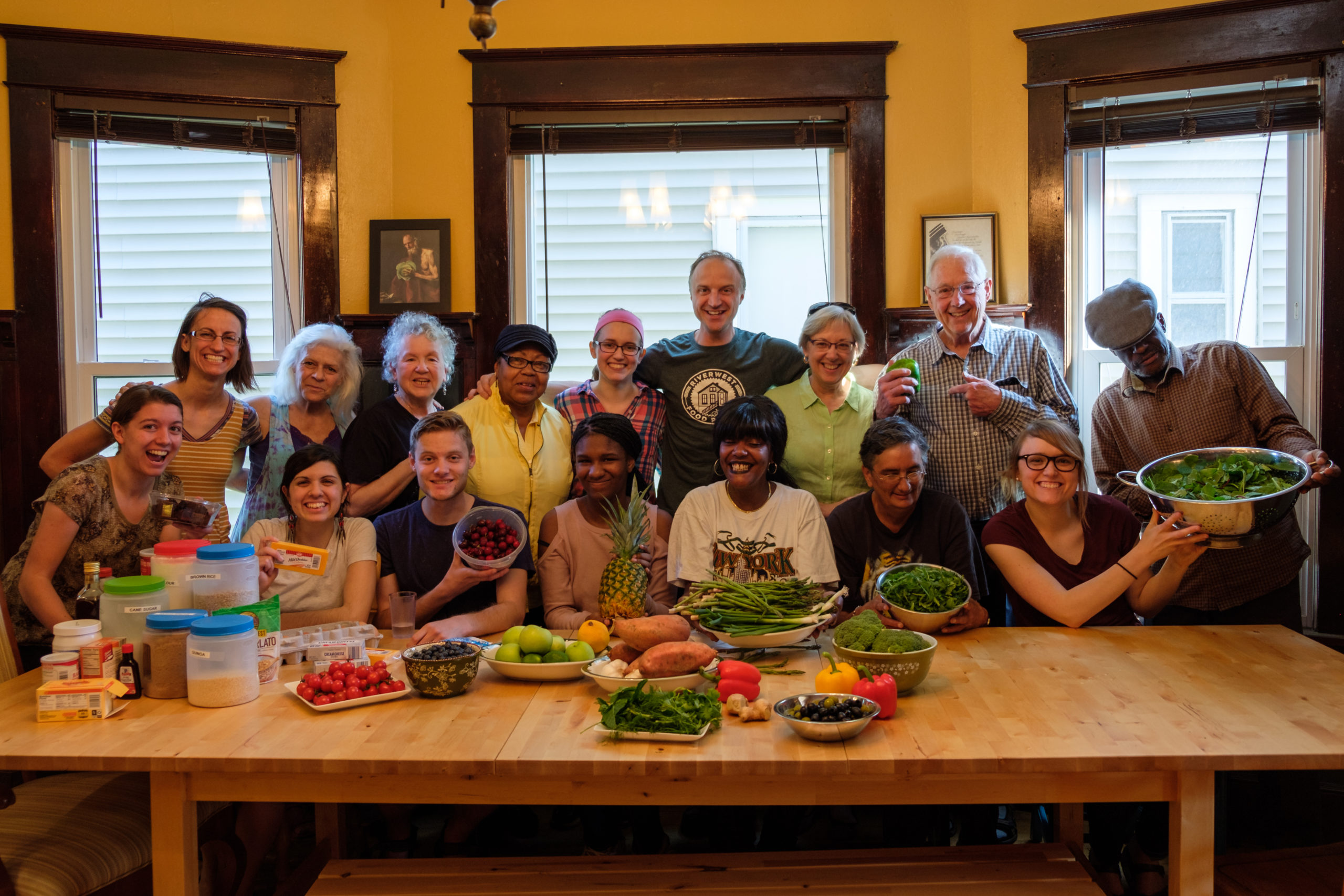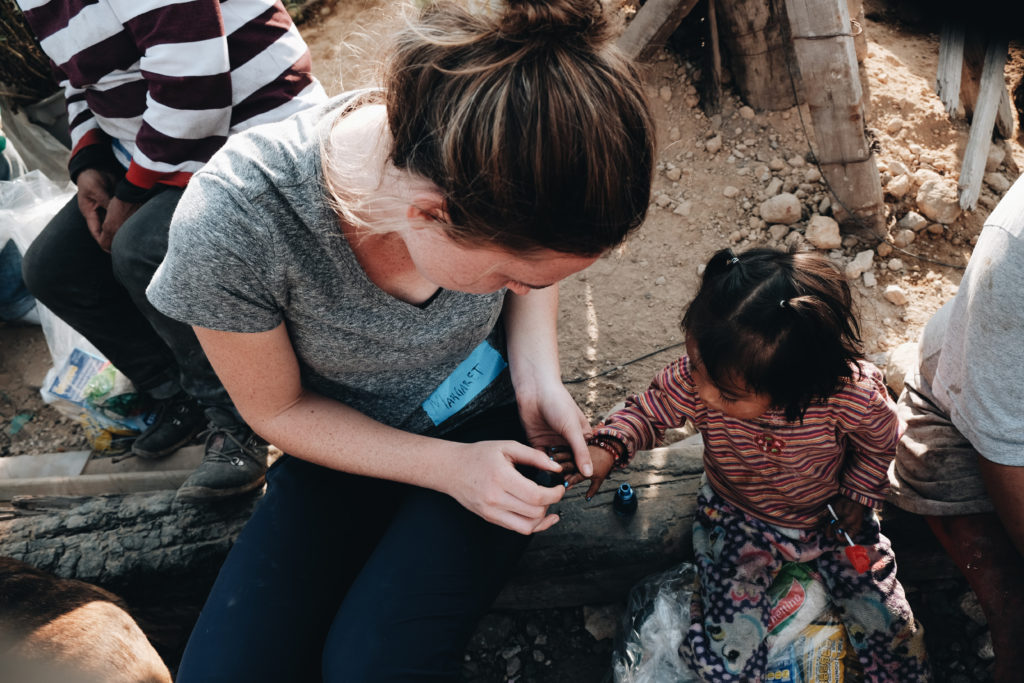One of the biggest problems with poverty, says Samantha Vosters, is distancing yourself from it. “It’s really important for everyone to have a relationship with someone who is truly in material poverty,” Vosters says. “People need justice, they need your charitable heart, and if you don’t have that personal encounter, you’re not going to be aware of the poor’s struggle in America. It is a real struggle."
And though Vosters has never been materially poor, she learned of it as a kid. Her father had lost his own father when he was just 10 years old. He was raised, along with 11 siblings, by their widowed mother running a farm by herself.

Samantha Vosters
“He would tell me stories about eating ‘ketchup sandwiches’ because that’s all they had,” Vosters remembers. On special nights their meals consisted of French fries and shakes because potatoes and milk were things the farm could produce. “I had this realization – Dad grew up poor.”
That realization, along with the example of Dorothy Day and some considerable time volunteering with the Missionaries of Charity, planted a seed, so to speak, and a vocation. For the past five years, Vosters has worked at the Riverwest Food Pantry in Milwaukee, helping to grow the organization from its modest beginnings more than 35 years ago as a simple food shelf, into a community effort that strives to fight not only hunger, but intractable poverty. Their mission centers on the effort to “come together around food to relieve hunger, improve lives and grow community well-being.”
This mission means living in and committing to the community Riverwest serves. Vosters has been especially involved in establishing the Mission House at Riverwest, where she lives with five volunteer interns, who devote one year to living a community life of prayer, silence and service to Riverwest and its constituents under the mentorship of Vosters and executive director Vincent Noth. It is work that is revitalizing a once-dying community – currently serving more than 12,000 people a year, a third of which are children.
Rooted in adoration and the liturgy, Mission House was largely inspired by Vosters’ time in Catholic studies, especially her year in Rome.
“Living the life in Rome,” Vosters said, “with a specific, intentional group of people – studying with them, recreating with them, discerning life with them – taught me so much about what friendship was all about ... [it] was so rich and rewarding, and also deeply challenging. It was a deep school of love. I still have my best friends of my life from that year. And honestly, the only reason I can persevere in my vocation and work is because of the challenge and encouragement from these friendships that are so deeply rooted in the Lord.”
Choosing to move from the rural Wisconsin world in which she was raised to the inner city, Vosters is keenly aware of the tension between not having experienced true material poverty and living among those who have known nothing else. But food, surprising as it may sound, helps to cut through that tension.
“What is so great about food,” Vosters said, “is that everybody needs it! We all are dependent on it and it has the power to unite people in a strong way.”
Mission House often hosts community dinners where everyone is assigned to cook one part of the meal.
“You learn a lot cooking with other people from other backgrounds,” said Vosters,
who cherishes these community events. “It reveals the person and their history, their interaction with food ... Food brings us together. It tells a story.”
A harsh and dreadful - and beautiful - thing
It’s delicate work to live with and serve the poor. Dorothy Day has been a natural heroine for Vosters. She was inspired by a quote Day was fond of repeating from Fyodor Dostoevsky: “Love in action is a harsh and dreadful thing compared with love in dreams.”
“I always thought [that quote] was so beautiful,” Vosters said, “but then the more I worked, I realized, it was dangerous. It was this ‘love in dreams’ that I had about [living among the poor]. Actually working with not only the materially poor, but even with your co-workers, you realize that love is really a demanding thing. I am constantly surprised by the demands that Jesus makes of us and I often find myself thinking, ‘I can’t do this!’”
Vosters remains very conscious of her dependence on God and her own personal poverty.
My boss is great at emphasizing this,” Vosters said. “Every time we open our store on Saturday morning, we say the same thing. ‘Everybody is here to give and everybody is here to receive.’ ... It is so essential that we hear that every week. There is a way of being with the poor that can ostracize them more instead of just being with them. I have to remember that I am also poor. That has been an important way that we look at things. We are all one community.”
A community where nothing – and no one – goes to waste. One of the founding ideas of Riverwest’s work was given to them by one of their shoppers, a formerly homeless woman who pointed out that compost is the most beautiful part of the garden. When she first visited the pantry, she felt worthless. She was taken aback when a Riverwest volunteer asked her to help out.
 “She assumed that being homeless disqualified her from holding any kind of role,” Vosters said. “But as a result of being recruited, she came to understand ‘I have something to give, too.’”
“She assumed that being homeless disqualified her from holding any kind of role,” Vosters said. “But as a result of being recruited, she came to understand ‘I have something to give, too.’”
The woman eventually took over the clothing department portion of the pantry, running their thrift shop, and was later trained in Riverwest’s mentorship program, walking through the experience of homelessness and poverty with others.
“That’s what the compost is,” Vosters said. “What we’re trying to say is that things that people think are of no worth and want to throw away – like our weaknesses, our poverty, even homelessness – we think, this is no good, but actually, that weakness can be the richest thing, a great strength.”
For her part, Vosters recommends “composting.”
“Get into the mess,” she says. “Don’t be afraid of the mess."







